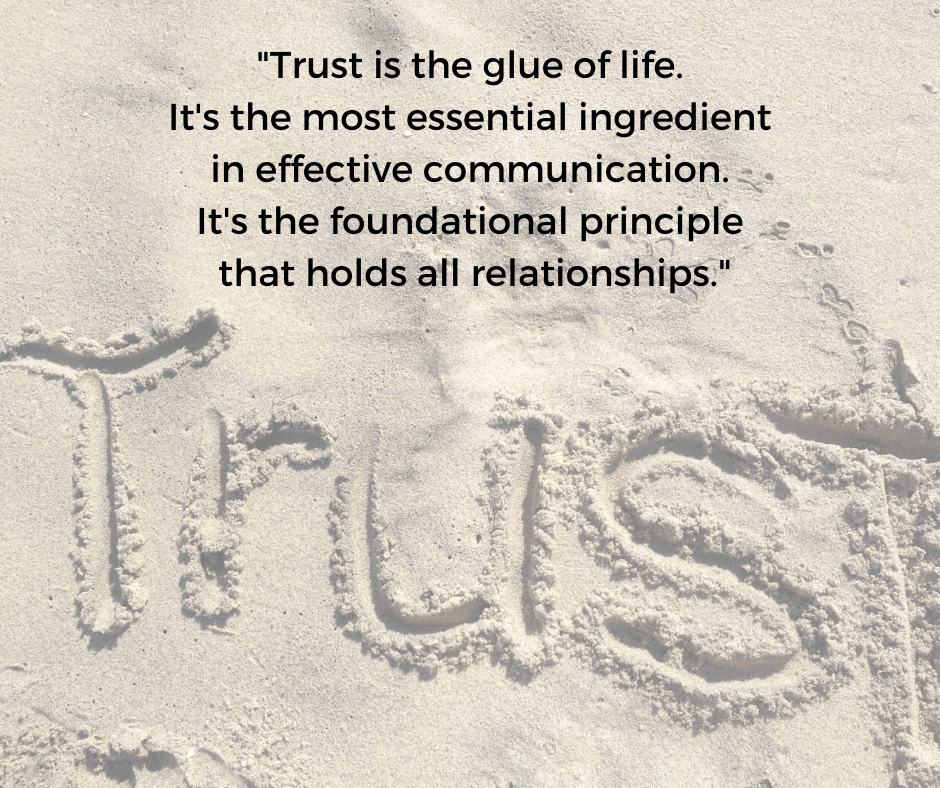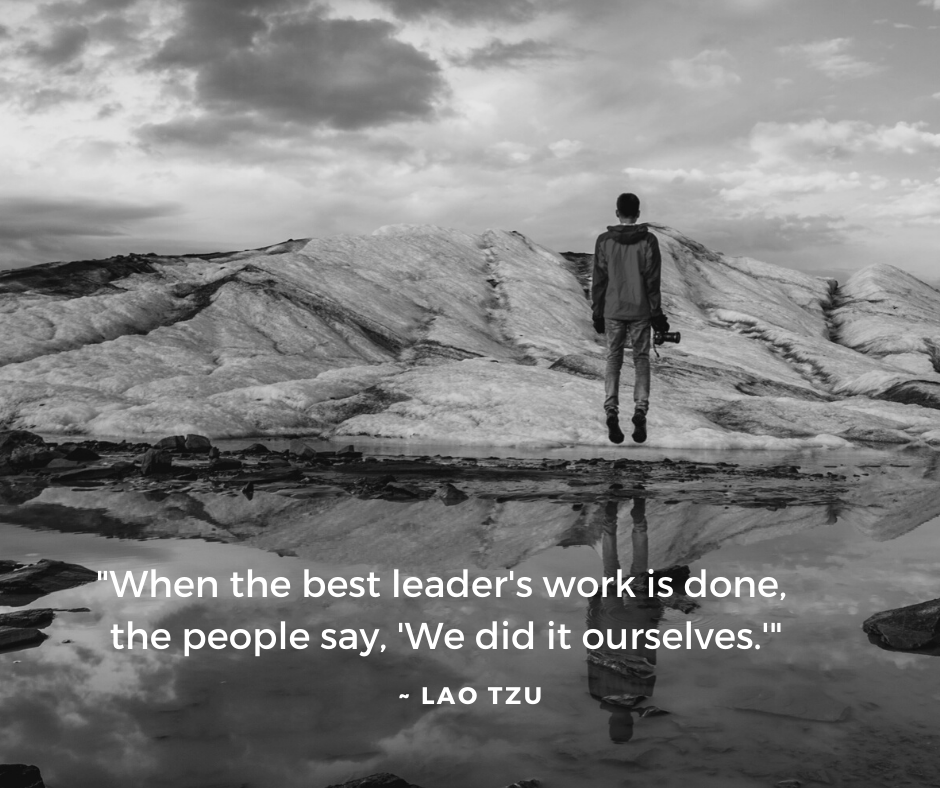As a leader, the degree to which you’re able to build trust directly affects the degree to which you’ll meet your goals.
So what are the 10 best ways to build trust with your team?

10. Be competent.
9. Act on your morals.
8. Transfer your belief.
7. Give credit.
6. Communicate.
5. Be transparent.
4. Demonstrate compassion.
3. Show you value relationships.
2. Give trust.
1. Have integrity.
Now, let’s unpack these in more detail…
10. Be competent.
Know your business. Learn and put into practice. Seek more knowledge and practice. Then turn good practice into habits that demonstrate you know your stuff.
9. Act on your morals.
“Actions speak louder than words.” What do your actions say about your ethics?
Tom Fox, with the Washington Post, interviewed best selling author Stephen M.R. Covey on the topic of building team trust. (You may know Stephen R. Covey, his father, from his best-seller, “7 Habits of Highly Effective People.” Stephen M.R. Covey followed in his father’s footsteps with the book “The Speed of Trust.”)
In this interview, Covey states that one of the most important elements to building trust is credibility. Explaining further he says that credibility comes from a combination of competence and their character. And character comes from deep-seeded beliefs, and our morals; it makes a person who they are.

While a person’s character and know-how are both important, they may vary in importance based on the circumstances. In one situation, you might trust someone more who shows strong character, where knowledge or abilities aren’t as necessary. Conversely, there may be other situations where a leader’s competence may lead to trust. (1)
8. Transfer your belief in the mission.
This comes from a combination of communication and passion. Many have passion and don’t transfer that passion to others. Still others communicate direction well, but lack passion in their mission.
People have trust in those who guide a team with expressed conviction. A leader who has such strong belief in the mission that they’re willing to go down if the ship sinks, will often have a team who’s right there with them.
7. Give credit.
Recognize team members when they succeed. Publicly celebrate the wins. (See post on being a positive leader). When you fail, take credit for it. Show humility, and admit mistakes.

6. Communicate, communicate, communicate.
Teams develop trust in leaders who set clear objectives and then communicate the goals, the strategy, and their passion for project. Allow for discussion and feedback loops.
5. Be transparent.
Signal your behavior. YOU know what you’re planning; you’re in your own head. Others may, (and often do) think completely differently, but it doesn’t mean that you can’t be driving in parallel lanes toward the goals. Let team members know your intent. People are more trusting when they have an idea of what to expect.
4. Demonstrate compassion.
Children who grow up with loving and caring parents trust their parents. Why? Because they know that their parents have their best interests at heart.
Employees who feel compassion from their leaders through their words and actions can develop a similar trust. Compassionate leaders demonstrate they care about their associates, and these associates trust that their leaders have their interests in mind.
3. Demonstrate you value relationships.
This is broader than #4, but includes compassion. It includes social awareness. Leaders who are able to use emotional intelligence to help them steer their group of individuals – each with individual emotional needs—are more likely to develop trust with their employees.
Act in ways that show you have the backs of the team members. Let them know that while you’re aware of politics, you’ll navigate the politics in ways that show the team that they’re supported.
2. Give trust.
Model behavior that you’re seeking from your team. If you want them to trust you, show you trust them.

This doesn’t mean to give carte blanche to everyone all the time. Hold team members accountable, but trust that can and will reach their goals if you provide the support they need.
1. Have integrity
Do what you say you will do. Say… do. Communicate… follow through. Period. What are we, really, if we’re not the sum total of what we say, what we do, and the combination of those two things?
Many argue that, in today’s society, we’re a little short on integrity. It’s too easy to change your mind, to have something better come along that more worthy of your time, to say we “got busy.” Excuses are easy. Holding yourself accountable to your word can sometimes be very uncomfortable.
Yet, having integrity as a leader is a key element to establishing and maintaining the trust of your team.
If circumstances change, which they do, and it causes you to fall out of integrity, own it to the team, explain it, and let it be a rarity. Your team will appreciate and respect you for it.
Why Is Trust Critical to Team Success?
We’ve all heard Aristotle’s truism, “the whole is greater than the sum of its parts.” This is definitely the case when it comes to teams in the workplace. Everyone has to work in concert for the team to successfully reach their goals. The team cannot do this there’s not mutual trust among team members, particularly between the team members and the leader of the group.
Consequences of Low Trust In A Leader
When trust is lacking, a number of negative consequences can result. One of the primary consequences, which leads to others is:
Heightened feelings of vulnerability– Team members feel unsafe, or possibly threatened. Because of this, they’re less likely to take risks, diminishing creativity. Unsafe feelings also encourage defensive behavior; team members spend more time thinking about and doing things that protect their self interests than focusing on the team goals. While they may want to show the leader that they’re doing their jobs, team members will be less likely to “go the extra mile” out of fear. This can lead to average or poor customer service or output, ultimately resulting in reduced profits.
This vulnerability or concern for safety can lead to:
- Reluctance to work on relationships within the group- If a team member lacks trust in the team leader, they’re less likely to work on developing a better relationship with that manager. Additionally, they may be less likely to put effort into other relationships.
- Reduced information flow- Team members may hoard information, keeping certain knowledge to themselves in an effort to have some control, and to protect themselves.
- Increased stress- Safety is one of Maslow’s basic needs (See Maslow’s Hierarchy of Needs on the post Foundations of Leadership.) When a person doesn’t feel safe, either from a physical concern, or a perceived concern, it causes stress.
- Reduced collaboration- When groups lack trust in their leader, team members are less likely to share information, brainstorm, skill-share, etc.
- Disinterest / Disengagement -Employees who don’t trust their leadership can distance themselves from the business’ initiatives. This can be a self-preservation tactic, a way keeping emotions in check and reducing stress. Disengagement of employees can lead to some or all of the negative consequences listed above.
- Team against leader- Groups who don’t trust their leader may be more likely to participate in non-productive behavior, such as gossip. If negativity escalates they may even become mutinous.
- Team members leave the organization- Again, because of the need for self-preservation, good employees may leave the company and seek another workplace where they feel more comfortable.
A Note on Lost Trust
Can trust be earned back from a team once it’s lost? The answer is yes, but unlike individual relationships, you’ll have more personalities to win back. And negative momentum within a group can be a powerful force.
If you’ve done something to lose their trust, start by having open communication about it. Explain your reasoning, but it’s important that you actively solicit their participation in the discussion. And listen. If it is called for, own your mistakes. Humility can help with acceptance. Just know it may take a little time, though, since trust is something that’s built through words and actions.
Source:

